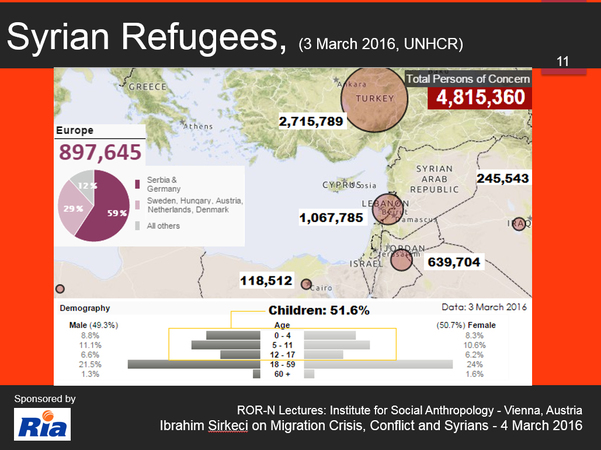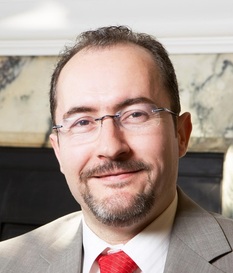 Ibrahim Sirkeci (Regent’s University London) The current migration crisis we face in Europe is the biggest crisis since the last biggest crisis. In about three decades we have seen millions of Kosovans, Bosnians, Kurds, Somalis, Yemenis, Sudanese, Afghan and others fleeing their homes. Syrians are perhaps too close geographically and a little too many. Europe largely failed to embrace and be proud of its tradition of being a sanctuary for those in need of refuge. Politics and media operate on short term parameters and unfortunately these influence the public opinion more than the science and facts can do. Yet, we have to emphasise the facts over and over again. First of all, not only Syrian asylum seekers but all migrants are driven by the forces of conflict, discomfort, disagreements, tensions and the like. Nobody moves unless there is something discomforting. This is why there are very few migrants in the world. Only 3% of the world population live outside the countries where they were born. That is 243 million out of 7,349 million. Syrian refugees represent even smaller fraction. So far the total number is 4,8 million and only about 1 million arrived in Europe. This equates more or less what the Gallup Poll predicted before 2011.[1] This means the current conflict in Syria has just speeded the process while the migration pressure was already there. In several conferences and lectures I have explained this already but migration crisis we face today is due to three deficits: demographic deficit, development deficit and democratic deficit. One of these deficits is enough to trigger migration but countries like Syria usually have all three. A few facts to remember; Syrian government have not been the most democratic and denied even basic citizenship rights to some groups including Kurds. Despite some oil reserves, Syria has been relatively poor with per capita income below $5,000[2] accompanied by large income inequality.[3] Its population has been fast growing with high fertility rates creating more employment pressure and more emigration pressure. Unless you address these issues in Syria and elsewhere, migration crisis will continue. Most of the talk recently revolved around money. Either it was the cost of hosting refugees or the amount of Euros to bribe Turkey to keep them there. One way or another Turkey will have enough resources to house Syrian refugees. The cost of accommodating a refugee varies but often it is absorbed in totals. In other words, one can only spend as much as she has access to. Per capita cost to Turkish citizens is about $100 a year in terms of sharing public resources/services. The total estimated costs are less than 3% of Turkish GDP. Due to limited number of Syrians arrived in Europe, this figure is much smaller for the EU’s $18.5 trillion GDP. Some even argues that two cents levy on petrol prices will solve the problem forever. Nevertheless, the wrong assumption here is that having these movers is a burden, a costly ticket. The fact is they contribute much and create much. They pay taxes, they create value too. According to a report, Syrians were the owners of 2.4% of newly established businesses in Turkey in 2014. Syria is used to be one of the largest remittance receiving countries. Now I believe much of these remittances go to Turkey, Jordan and Lebanon, where 90% of refugees are. To help, companies like Ria Money Transfers offered zero fee transfers to Nepal[4] responding to the call by World Bank’s Dilip Ratha.[5] May be we should repeat the call for Syrians. This would perhaps send some positive waves. [1] See Sirkeci, I., & Esipova, N. (2013). Turkish migration in Europe and desire to migrate to and from Turkey. Border Crossing, 2013(1), 1-13. Retrieved from http://www.tplondon.com/journal/index.php/bc/article/view/89 [2] See http://tplondon.com/journal/index.php/bc/article/viewFile/373/294 [3] See http://carnegie-mec.org/publications/?fa=43355&lang=en [4] See http://riafinancialblog.com/2015/05/14/remittances-to-help-reconstruct-nepal-ria-continues-to-offer-zero-service-fee-globally/ [5] See http://blogs.worldbank.org/peoplemove/help-nepal-waive-remittance-fees-and-open-door-wider  Ibrahim Sirkeci is Ria Professor of Transnational Studies & Marketing and Director of Centre for Transnational Studies at Regent’s University London (http://www.regents.ac.uk/rcts). Sirkeci holds a PhD from University of Sheffield and BA from Bilkent University. Before joining Regent’s in 2005, he worked at the University of Bristol. His research covers migration, ethnicity, remittances, labour markets and integration. Sirkeci’s research has been funded by the World Bank, Ria Money Transfers, and British Academy among others. He is the chair of Turkish Migration Conferences, the 4th will be hosted at the University of Vienna (12-15 July 2016) Sirkeci is also the editor of several journals including Migration Letters, Border Crossing, Kurdish Studies and Remittances Review. He authored several books on migration including Cultures of Migration, the Global Nature of Contemporary Mobility (U. of Texas Press, 2011), Migration and Remittances during the Global Financial Crisis and Beyond (The World Bank, 2012), Turkish Migration, Identity and Integration (TPLondon, 2015), Conflict, Insecurity and Mobility (TPLondon, 2016). Ibrahim Sirkeci can be contacted at [email protected], http://sirkeci.co.uk and @isirkeci
1 Comment
Great report! I think the increase in world population is slowly slowing down. But according to live-counter.com, it recently passed the 8 billion mark:
Reply
Leave a Reply. |
Archives
June 2022
|
No part of this publication may be reproduced, stored in a retrieval system or transmitted in any form or by any means, electronic, mechanical, photocopying, recording or otherwise, without prior permission of the copyright holder, except for the inclusion of quotations properly cited.
Published in Vienna, Austria by ROR-n.
